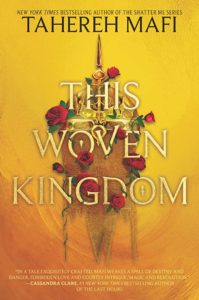„THIS WOVEN KINGDOM” de Tahereh Mafi
 Cînd eram mică citeam cu disperare povești nemuritoare. Deși am peste jumătate de secol, îmi plac în continuare poveștile.
Cînd eram mică citeam cu disperare povești nemuritoare. Deși am peste jumătate de secol, îmi plac în continuare poveștile.
Iar scriitoarea Tahereh Mafi, în opinia mea o Sheherazade modernă (născută în USA din familie Iraniană), este exemplul perfect pentru această pasiune a mea.
Mi-a plăcut enorm de mult romanul „This woven kingdom”, deoarece sub formă de poveste, scriitoarea ne pune să ne uităm în oglindă și să vedem cum ne justificăm comportamentele la nivel de indivizi respectiv la nivel de țări.
De ce mi-a plăcut?
Pentru că atunci când am citit despre războiul dintre Jinn și Clay („human beings, they called themselves”) mi-a fost ușor să-mi aduc aminte de războaiele actuale, unele din ele chiar televizate în direct. Și îmi aduc aminte cum se spunea că țara cotropitoare era superioară celei invadate:
„For centuries before the bloodshed between Jinn and Clay had begun, Jinn had built their kingdoms in the most uninhabitable lands, in the most brutal climates–if only to be far from the reach of the Clay civilisation. They’d wanted to exist quietly, peacefully, in a state of near invisibility.
But Clay, who had long considered it their divine right–no, duty–to slaughter the beings they saw only as scions of the devil, had mercilessly hunted Jinn for millennia, determined to expunge the earth of their existence.”
Pentru că atunci când am citit că Alizeh este fata aleasă de magie să-și elibereze poporul Jinn, mi-a plăcut faptul că părinții ei nu s-au mulțumit cu profeția și au ales drumul cu muncă, pentru a o pregăti pentru rolul ei:
„Alizeh’s mother and father had thought it critical to teach their child not only to care and clean for her own home, but to have basic knowledge of most all technical and mechanical labor; they’d wanted her to know the weight of a day’s work.
But then, they’d only meant to teach her a valuable lesson–they’d never meant for her to earn her living this way.
While Alizeh had spent her younger years being honed by masters and tutors, so, too, had her parents humbled her in preparation for her imagined future, insisting always upon the greater good, the essential quality of compassion.”
Pentru că atunci când am citit că Alizeh a trebuit să se ascundă de asasini, muncind ca slujitoare în caselor bogaților Clay, am înțeles cu cîtă ușurință poți să disprețuiești pe cineva care se trage dintr-un popor așa-zis inferior celui din care tu te tragi. Și aici mă gândesc la românii care nu au fost respectați când munceau în alte țări dar și la imigranții care muncesc acum în țara noastră:
„In her weaker moments Alizeh longed to lash out, to allow her anger to shatter the cage of her self-control. She was stronger than any housekeeper who struck her; she was capable of greater force, greater strength and speed and resilience than any Clay body that oppressed her.
And yet.
Violence alone, she knew, would accomplish nothing. Anger without direction was only hot air, there and gone.”
Să nu vă lăsați păcăliți de denumirea poveste. Tahereh Mafi folosește un limbaj sofisticat și prezintă personaje care au conștientizări puternice.
Kindle, 2022

Recent Comments